Is Propane Heavier Than Air? Factors, Science, & FAQ
-
Pete Ortiz
- Last updated:
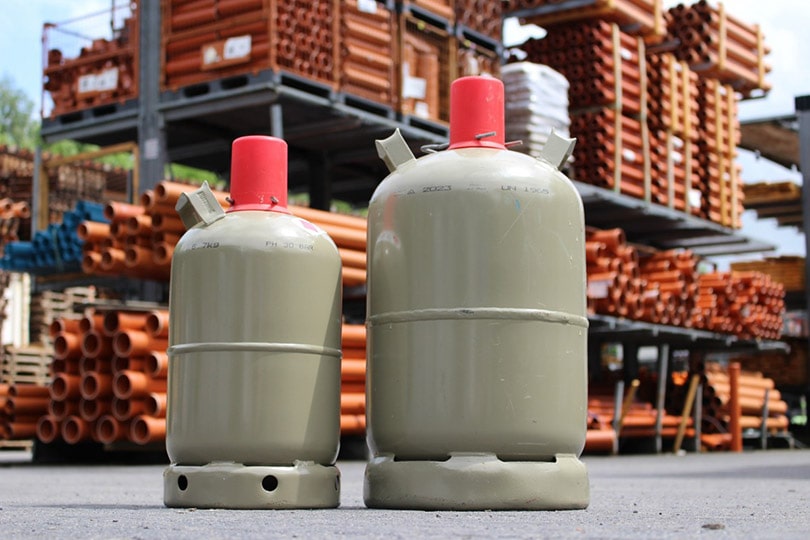
In many ways, propane is often compared to its mother element, natural gas. While the two gasses are comparable in many aspects, the most basic distinction is their weight against air. Unlike natural gas, propane is heavier than air. However, if it is liquefied and measured against air, propane becomes lighter.
Understanding the properties of propane and how it behaves upon leaking is essential, especially if you power your home appliances using this flammable gas. For that reason, this article will walk you through what to expect and how to react whenever you suspect a gas leak.
Does Propane Sink or Rise in Air?
Since propane is heavier than air, the gas will sink as low as possible whenever a gas tank leaks. Propane is ecologically friendly, meaning it doesn’t leach into the soil or dissolve in water when a gas leakage occurs outdoors. Rather, it dissipates into warmer conditions of the atmosphere.
However, if the gas leaks in a concealed area such as a basement or unventilated room, it poses a greater risk of explosion because it’s highly flammable. Since it’s odorless and colorless during its production, manufacturers deliberately add a harmless odorant known as Ethyl Mercaptan (the sulfur smell that resembles rotten eggs) to make a propane gas leak easily distinguishable.
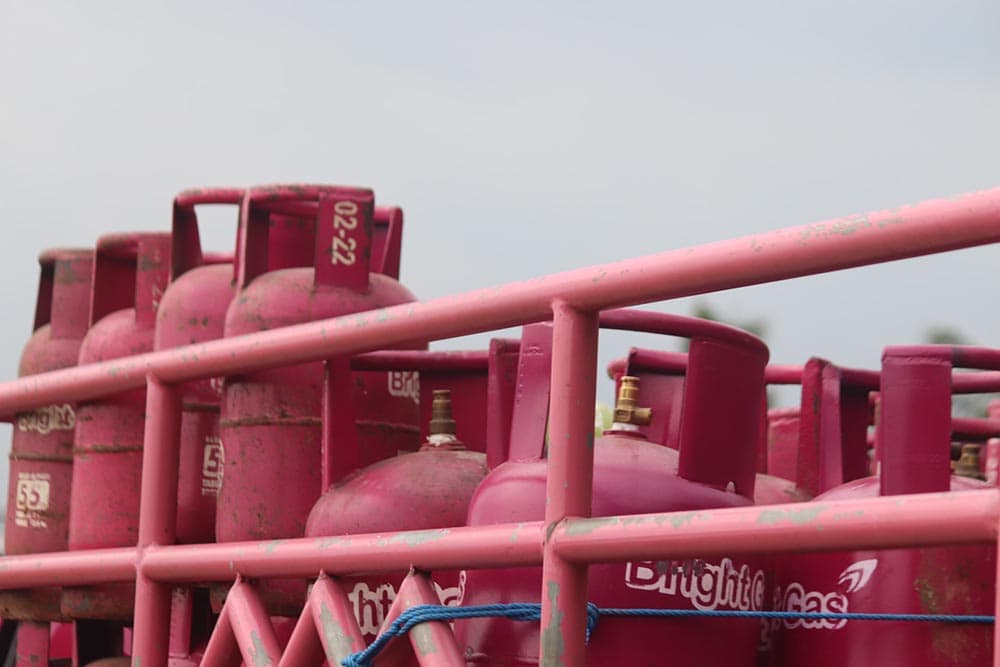
How Long Does Propane Gas Take to Dissipate?
The correct answer is this: it depends on the amount of gas leaked and the weather conditions. If you suspect a gas leak inside your house, it’s better to get at least two hours of flowing air to get out the gas. If you have more windows and fans, the better for you. Do not light any flame or turn on electric devices within that time.
Propane tends to take longer to dissipate when the weather is colder because the vapor particles remain numbed together.
The Significance of Propane’s Density
Propane is a liquefied petroleum gas (LPG), meaning it is available in two states: gas and liquid. To understand the two forms better, we’ll use the analogy of water (liquid) and steam (vapor) to compare propane in liquid and gas states. The boiling point of water stands at 212° F. When water particles reach this temperature, they are converted to steam.
On the other hand, propane’s boiling point is -44° F. In the same way as water, propane particles boil and convert to gas when heated at -44° F. Propane manufacturers store the gas in sealed containers under pressure to keep it below its boiling point.
When it’s released into a supply line, the pressure reduces, and the liquefied gas “boils” off in gaseous form, becoming what powers our heating systems and home appliances.
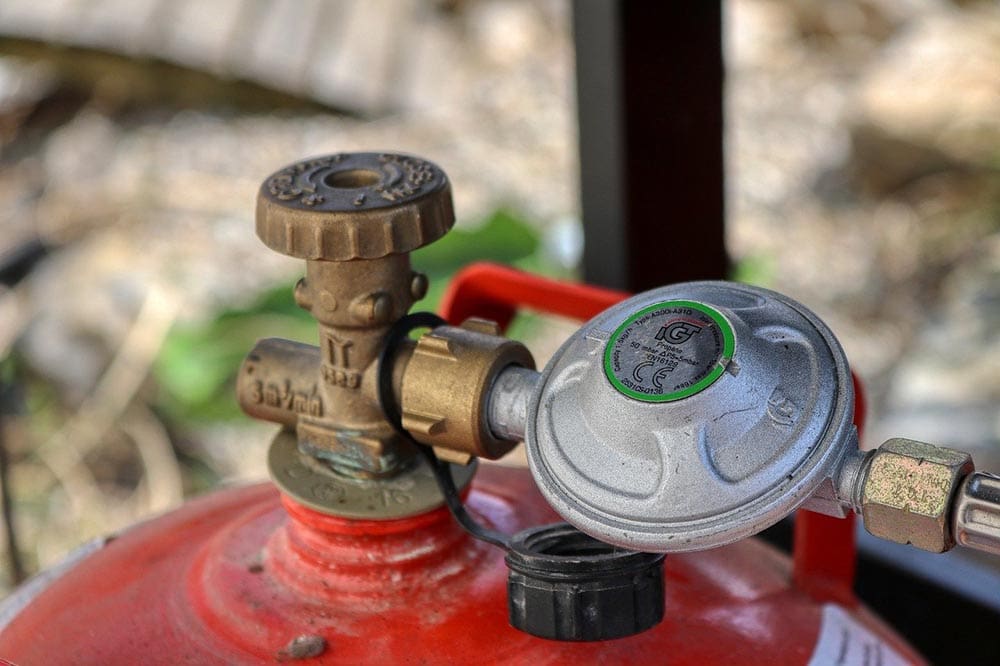
How to Detect Leaking Propane
Since propane is highly flammable, it is wise to conduct a leak test first, especially if you haven’t been using your gas tank for a while. The fastest and easiest way to know your tank is leaking is when the skunky odor of propane hits your nostrils. It has an unpleasant smell that is often compared to that of rotten eggs or sulfur.
However, this may not be an excellent way of detecting gas leaks. Not everybody has a perfect sense of smell – perhaps you are suffering from an allergy or cold, or are too old, or under the influence of drugs that impair your sense of smell.
In that case, it’s important to install gas leak detectors in your home to monitor the concentration of propane gas around. If propane levels rise, the detectors sound an alarm to alert about the risk of explosion.
Propane gas detectors can be found in every home improvement store. You’ll be advised to install them near your propane-powered appliances such as beside furnaces, heaters, and gas tanks. Ensure you set them slightly above ground level because propane is a sinker in the air.
Alternatively, you can suspect a leak if your propane-powered appliances stop working as usual. If your grill, fire pit, or space heater produces an unusually weaker flame, you need to confirm your propane isn’t leaking. The same applies when there’s an unusual spike in your usage behavior.
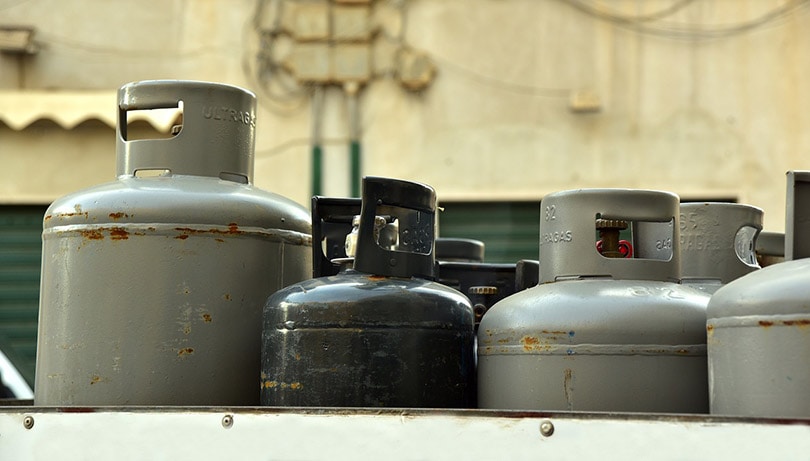
What to Do When You Suspect a Propane Leak
Propane safety is a priority whenever you notice your gas tank or supply line is leaking. If the leak occurs outdoors, report the issue to 911 immediately – don’t even think about finding the source yourself!
If it occurs inside your house, the following safety guidelines will help you keep yourself and your family safe:
- Confirm that the tank is leaking: Take a detector solution or soap water and apply it to the tank’s cylinder valve or the regulator outlet pipe. Next, open the cylinder valve as slowly as possible. If you notice bubbles forming, it means there’s a leak.
- Minimize the risk of explosion: When propane gas leaks, the chances of an explosion are so high that even the slightest ignition can cause it. If there are any open flames inside the house, you are just lucky to have noticed the gas leak at the right time. Put them off immediately and get everyone else out of the area. A common mistake people make is to turn on light switches or appliances. Remember, even the slightest spark can cause an explosion, so don’t.
- Cut off gas supply on the tank: After putting off any open flames, your next step should be to shut off the gas supply valve by turning it clockwise. This will prevent more gas from leaking.
- Evacuate the area immediately: Breathe because you just contained a risky situation. But you aren’t done yet; you’ll need to open as many windows as you can and exit the building immediately. Don’t stop to collect any possessions as breathing in more propane could harm you. After you’ve opened the windows, fresh air will come in and the built-up propane gas will dissipate within the next 1–2 hours, reducing the risk of fire to almost zero.
- Call your propane supplier: Once you are out and in a safe location, you can either call your gas supplier or 911. They’ll send in a fire department to assess the situation, check the system, and provide extra safety measures. Do not go back to your house until they have stopped the leak and confirmed whether it’s safe to return.
- Schedule a propane tank inspection: Do not use any of your propane-powered appliances before scheduling a detailed inspection to ensure they won’t leak again in the future. In fact, routine inspection is a recommendable solution for preventing gas leaks from happening.
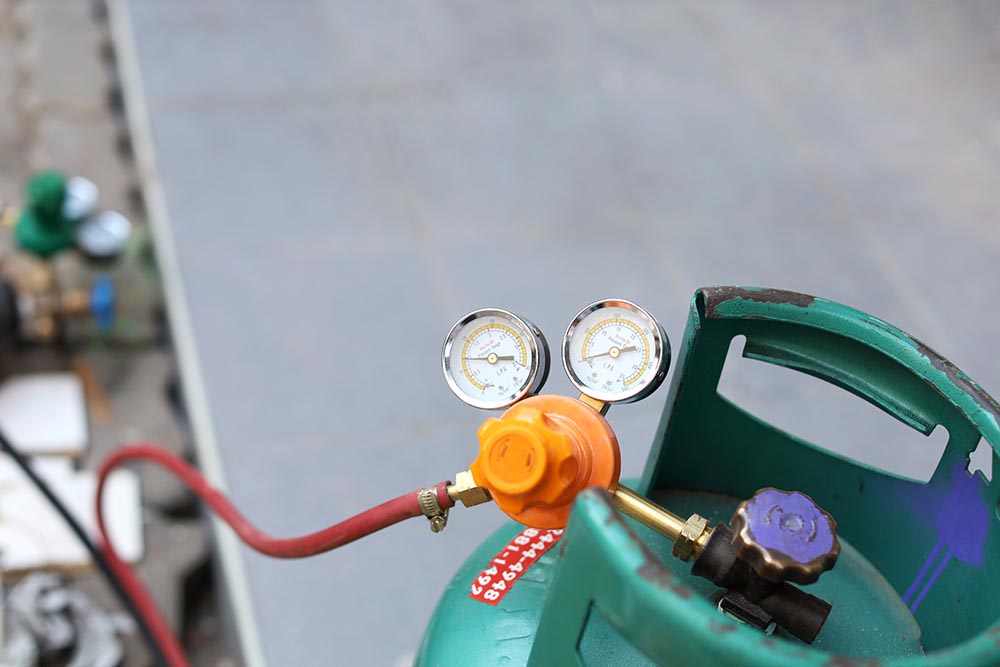
How Harmful Is Propane in the Air?
- According to ResearchGate, inhaling low quantities of propane doesn’t do much harm. However, if the concentration is too high, it displaces oxygen from the ground up, meaning you’ll struggle to breathe. Inhaling high quantities of propane may cause problems such as quick heart rate, fast breathing, exhaustion, clumsiness, and emotional changes.
- When oxygen becomes scarcer, you’ll start experiencing nausea and vomiting, convulsions, collapse, coma, and potential death. Exerting more physical energy does nothing but accelerate the effects.
- Lack of oxygen can cause permanent damage to some body organs such as the heart, brain, and nervous system.
- Propane doesn’t irritate the skin but may cause a chilling/frozen effect when it comes in direct contact with liquid gas. The chilling effect may cause numbness, prickling, itching, stiffness, or a burning effect on the skin, potentially turning it yellow or waxy white. It may also cause blistering, infection, and tissue death in severe cases.
- The National Library of Medicine reports that propane does not affect the eyes unless it’s in liquid form, in which case, it may lead to blindness or permanent eye injury.
The DOs and DON’Ts of Handling Propane Gas Tanks
- DO NOT store propane tanks in hot places. If the temperature exceeds 120° F, the gas tanks become susceptible to leakage and, even worse, combustion.
- DO store them in their upright positions. Otherwise, they might roll over and cause accidents. Putting them on their sides could also result in liquid and gas leakage.
- DO NOT put propane tanks on wet surfaces. Water can cause rusting, rendering the tank ineffective.
- DO refill your gas tanks in licensed stores by authorized professionals.
- DO NOT refill outdated gas tanks with expired certifications. Besides breaching the law, you’ll be exposing yourself to the danger of a gas accident.
- DO NOT store propane gas tanks in a garage, carport, sunporch, or basement. It poses greater risks in case of a leakage.
Conclusion
Propane is heavier than air. While it’s an extremely safe gas, it doesn’t hurt to be on the safe side in case of an emergency. The best thing you can do is to avoid panicking upon realizing a leaking gas tank.
Now that you understand how it behaves, you can confidently and knowledgeably handle a propane gas leak situation to ensure you enjoy the years of your life safely and trouble-free. We hope you enjoyed reading this guide. Good luck, and stay safe!
Featured Image Credit: PxHere
Contents


